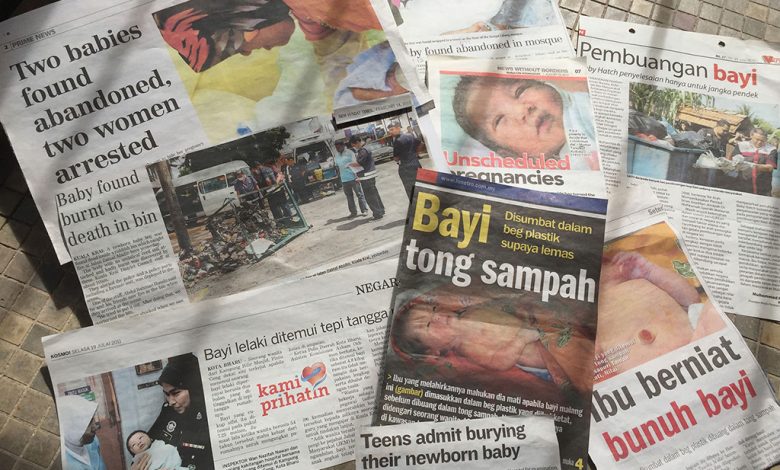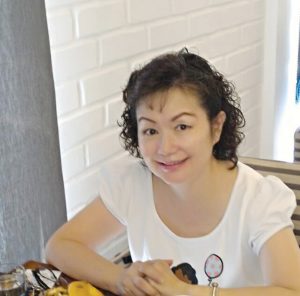

By Gisele Soo


Cases of baby dumping are on the rise in Malaysia as babies are frequently being abandoned in public toilets, rubbish dumps and even in mosques and prayer houses. Based on the Department of Statistics Malaysia, almost 100 babies are abandoned every year. More than half of them end up dead.
“A thousand cases were recorded from 2010 to 2019. In Perak, 39 cases were recorded from 2015 to 2019,” said Senior Assistant Commissioner Anuar bin Othman, Chief of Criminal Investigation Department, Perak.
Absence of Sex Education and Lack of Access to Contraceptive Methods Are Two Major Contributory Factors


“Some of the factors that cause the death of the child are unsafe delivery, which may kill both the mother and the newly-born, unhygienic environment and severe heart problems,” Pantai Hospital Ipoh Consultant Obstetrician and Gynaecologist Fertility Specialist, Dr Jaya Balan Valliapan explained.
Every individual should take ownership of the issue as the government alone cannot tackle the problem on its own. “This is a matter of grave concern. Society should make use of the Volunteer Smartphone Patrol (VSP) system which allows eyewitnesses to report without revealing their identity,” Anuar remarked.
According to the Oxford Dictionary, infanticide is defined as, “The crime of killing a child within a year of birth.”
Some of the reasons why women abandon their babies are insufficient coping skills, lack of problem-solving abilities, emotional immaturity and societal ostracism.
Importance of Sex Education


Sex education is still a taboo topic in Malaysia but there is an urgent need to make sex education accessible to everyone. Sex education can be defined as high-quality teaching about a variety of topics regarding sex and sexuality, understand the beliefs and values as well as norms about these topics. Besides, it also covers several aspects such as the understanding of body parts and the importance of protecting themselves. According to Dr Jaya, baby dumping cases are common among women aged between 16 and 22.


Committee member of the Perak Family Health Association, Fiona Fong and NGO volunteer, Halida Ali, agreed that the absence of sex education and lack of access to contraceptive methods are two major contributory factors. “These are the crucial preventive measures that every party should pay close attention to,” Fiona added.
Period of Self-Discovery
Self-discovery happens among adolescents where young girls and boys experience biological, psychological and social changes. Self-discovery, which can also be defined as an exploratory period, is a process of discovering and learning more about oneself and who you are. During this period, adolescents are curious and they have a strong desire to experiment. Unwittingly, their actions will put them at risk.


“Precautionary steps are important to protect girls against sexually-transmitted disease (HIV/AIDS) and pregnancy,” Halida posited.
Underlying Causes


Many of them who are single mothers or have delivered a baby out of wedlock are afraid to seek help due to several reasons such as religious concern and cultural sensitivity. In the Islamic perspective, sex is a filthy word. Thus, children are not encouraged to discuss sex openly with their parents. This explains why Valentine’s Day celebration is banned in Muslim countries as it may lead to negative consequences, like engagement in immoral activities. This conduct is being similarly opposed by other religions.
Islamic enforcement agencies come down hard on unmarried Muslims caught in closed proximity with the opposite sex. There have been many reported cases in the media. The objective is to shame and not to teach the wrong-doers.
The Qur’an explicitly says that killing a human being is equivalent to killing the whole of humanity. Every child has the right to live and should not be neglected.
Boys should learn to respect girls and not take advantage of them while girls should be on firm ground and learn to say NO. Educating children is the responsibility of every individual, especially parents. Teenagers should be empowered with sufficient knowledge and skill on sexual and reproductive health.


Dr Jaya stated that Malaysia is growing more westernised and is gradually losing its Asian values. On top of that, religious teaching which emphasises the importance of ‘sex after marriage’ is weakening, as teenagers become less interested in education. Plus, the frequency of youngsters engaging in negative social activities is skyrocketing.
Legal Perspective
According to Anuar, Section 317 of the Malaysian Penal Code states that ‘The punishment of an offence of parents or person responsible for taking care of a child under the age of 12 years who exposed or abandoned the child’ is imprisonment for a term not exceeding seven (7) years, a fine or both.
Solutions to Curb Baby Dumping
NGOs and public agencies have come up with numerous solutions to overcome the phenomenon. Some significant solutions are the introduction of baby-hatch (OrphanCare), awareness campaigns and counselling services.
Baby Hatch


Baby-hatch (OrphanCare) is a foundation introduced for mothers who have no plans of keeping or unable to care for their babies. OrphanCare acts as a temporary shelter for innocent lives. Baby-hatch can be found at KPJ Ipoh Specialist Hospital and some other KPJ hospitals in the country.
The increasing number of baby dumping cases should be brought to light and remedial action should be taken in order to solve the problem.
How Does It Work?


Infants left at the centre will be sent to the welfare department for adoption. It is a lengthy process where married couples who want to adopt have to go through a waiting list. A baby hatch gives abandoned babies a chance of being adopted by potential families.
Result of the Launching of Baby-Hatch Centres in Malaysia:
1) Between 2010-2014, 90 abandoned babies were adopted.
2) Nine per cent from 88 abandoned babies were placed in the baby hatch.
3) After counselling, 52 babies were placed with their own mothers.
4) More than 3500 parents have registered to be adoptive parents.
Counselling Service


When asked how he approaches baby dumping cases, Dr Jaya said the very first step is to contact and notify the mother’s parents and offer guidance to both the parents and the baby’s mother.
Awareness Campaigns
The government and NGOs work jointly to launch awareness programmes and campaigns for society providing knowledge and awareness on sex education. There are various types of awareness programmes such as seminars, exhibitions and talks on safe sex and sex education for teenagers in schools, colleges and local universities. Public speaking and awareness-raising programmes should be extended to the community so that the issue will have collective attention and be managed comprehensively.


Besides, a vast array of awareness campaigns and talks will be held in primary and secondary schools. The aim is to provide students with sufficient sexual and reproductive health knowledge. NGO volunteer, Pathma Devi Pakrisamy, mentioned that among the topics covered are ‘Safe and Unsafe Touch’, ‘Cinta Remaja’ (teen love) and ‘Early Pregnancy’.
The ‘Keselamatan dan Perlindungan Diri’ (Safety and Protection) handbook which covers ‘Good Touch and Bad Touch’ is initiated by the Perak State Government and Executive Councillor for Women and Family Development, Character Development and Social Welfare, Wong May Ing. These are distributed to the students.
Asked about the response to her talks, Pathma said it has been surprisingly effective. She added that success is largely influenced by the presentation strategy where she will firmly emphasise a two-way communication, which includes the use of language and the way the message is being conveyed.
“Language is a very important element to get students’ attention. Also, we need to accommodate them and to be extremely cautious with the words we use,” Pathma told Ipoh Echo.
Pathma pays close attention to the rural community, especially the B40 category. “My main target group is the rural community, they have very limited access to the internet and they need our help,” she stressed.
Don’t panic. There is still hope.
Here is a list of NGOs whom you can go to for assistance: Perak Family Health Association 016 524 7233, Malaysia Hindu Sangam Perak State 05 241 5859 and CARING Society 016 506 1974 or contact Talian Kasih at 15999.


